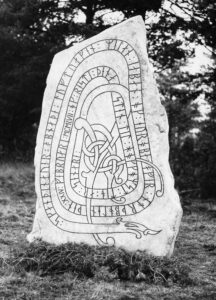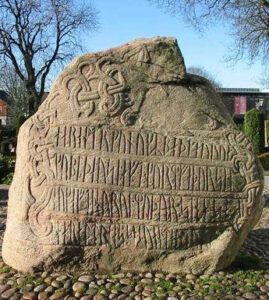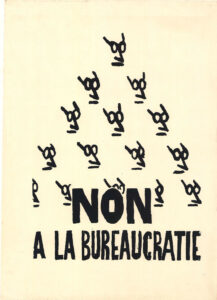“Not perverts but bureaucrats will set things off, and we won’t even know if their intentions were good or bad. Things will go off by command; they will be carried through according to regulations, mechanically, down the chain of command, with human wills bent, abolished, overcome, in a task that ceases to have any meaning”.[1]
– Jacques Lacan
Old Norse is the language of the Vikings. It is the language carved laboriously into runestones all over Scandinavia, indeed even as far afield as Ukraine. It is the language of the Icelandic sagas of the High Middle Ages, and the language which preserves most of our knowledge of Scandinavian mythology: Gods such as Óðinn and Þórr, the vengeful Fenrisúlfr and the end of the world at Ragnarǫk. It has been taught continuously in Denmark since at least the 1760s, when a commission was founded to safeguard the manuscripts of the Icelandic collector Árni Magnússon, who had left both his collection and his fortune to the University of Copenhagen. Next January, for the first time in 200 years, not a single university in Denmark will teach the language.

How did we get here? Back in the 1970s, Old Norse was being taught in the four major Danish universities: Copenhagen University, University of Southern Denmark (SDU), Aalborg University, and Aarhus University. Aalborg was the first to go. As far as I can tell the language was no longer taught there after Lars Lönnroth’s departure to take up a professorship in Gothenburg in 1982. At SDU, the language ceased to be taught in 2017, when the teacher’s part-time teaching contract expired. The former jewel in the crown of Old Norse studies, the Arnamagnaean Institute at the University of Copenhagen, stopped teaching Old Norse in 2018. This was following cuts recommended by the management consulting firm Struensee & Co., a subsidiary of Deloitte. Icelanders have since increased their calls for the manuscripts once given to the university by Árni Magnússon to be returned to Iceland. After all, nobody in Copenhagen is now learning how to read them. And so only Aarhus remained, where Old Norse was taught alongside Arabic, Greek, Hebrew and Latin in the Religious Studies programme.
Now, following a kvalificeret ansættelsesstop “cessation of new hires with exceptions”, our teacher of Old Norse, Dr. Karen Bek-Pedersen, who was already on a part-time contract, will not be renewed for the next semester of 2023. We hope that after next semester, the ansættelsesstop will be lifted and Karen will be re-employed – and we are fortunate that the management have expressed that they share this hope. Of course, Europe is entering dark times. How likely is it that we are going to have more financial flexibility to save Old Norse in six months or a year? Pessimism will be forgiven on this point. I am desperate to be wrong, but in the current economic climate it is hard to imagine that Old Norse will be coming back once it is gone, despite the very best of will from university administrators.

Here, I want to share a few observations about how a small but very important language ends up being killed (pending a miraculous resuscitation), and what should happen to make sure it does not occur. What is now happening at Aarhus is quite unlike what happened in Copenhagen in 2018. There, Struensee & Co. drew up a list of rules to do with enrolment, and specific programmes were subsequently targeted for closure. Management consultants took control of the university. They closed programmes which did not satisfy their ideologically-construed views of what was profitable or worthwhile to teach. They may have claimed it was all about cold, hard numbers, but the decision of what subjects deserve to be part of young people’s education is always ideological, even if it wears a mathematical prophylactic.
Here at Aarhus, nobody has singled Old Norse out. No consultant, no politician, no university manager. In fact, I suspect if we went and asked politicians and managers we would find them to be sympathetic to keeping Old Norse. For conservatives, this is the language of the vikings, yea, the language of the Jelling Stone, an image of which appears in every Danish passport. For the left and for liberals, this is the language of profound human experience – Old Norse literature is a cultural treasure which belongs to the whole world. Fiscal conservatives can rest easy too: Old Norse is phenomenally cheap to teach. We already have all the necessary books sitting in the library. Unlike STEM subjects we don’t need costly computers or lavish laboratories. Old Norse, like most of “the hard humanities”, incurs literally zero expenses beyond the wages of the teacher.

No, there is no malice here. Instead, here is what will happen next semester: Two hundred years of tradition will end. Denmark will become the only Scandinavian country where it is literally impossible to learn Old Norse (a language which is seen as worth teaching by universities in America, Britain, Germany, and – I am given to understand – Japan). And if Old Norse is not resuscitated next year, in time, the only people left in Denmark who will be able to read the Jelling Stone, or the Icelandic sagas, or the original texts of Old Norse mythology, will be people who studied abroad. All this will come to pass despite literally nobody wanting it to do so. Not a single hostile thought towards Old Norse will have been entertained by anyone in a position of power.

It will happen because rules have been made in a hurry, coming from uncertain places, and their application is having unforeseen effects. If we ask management to make an exception, management can quite rightly point to an economic crisis which is taking place at a national-political level. If we address ourselves to the politicians, they can simply say “ah, that’s an Aarhus University problem” and refer us back to the management. They’d both be right. Yes, our predicament emanates from the spasms of capitalism, as war forces prices to skyrocket and Europe begins to adjust itself to a new era of impoverishment. But it is bureaucracy – not war or capital – that has left Old Norse at Aarhus so vulnerable. In the ideal type of bureaucracy sketched by Max Weber, there was a person to whom one could turn called “a monocrat”: A person with whom the buck stops, a person with a desk full of buttons and a drawer full of coins. The monocrat was someone in the system with real power, to whom you could turn to get a fair hearing in a moment of crisis.[2] You might not get what you want with a monocrat, of course, but at least they were there to implore. However, bureaucracy has not really developed along the lines Weber envisioned. Instead, as Hannah Arendt noted:
In a fully developed bureaucracy there is nobody left with whom one could argue, to whom one could present grievances, on whom the pressures of power could be exerted. Bureaucracy is the form of government in which everybody is deprived of political freedom, of the power to act; for the rule by Nobody is not no-rule, and where all are equally powerless we have a tyranny without a tyrant.[3]

Quite so! If you want to save a language like Old Norse you will find that everyone who holds either purse strings or political power says “my hands are tied”. But you can’t find who it was who tied everybody’s hands in the first place, so that you may beg for their bonds to be loosened. One of the reasons we ended up here is that bureaucratic structures made it very hard to shore up the teaching of Old Norse at Aarhus while the going was still relatively good. We (here I speak of everyone at Aarhus Universitet) were the last university left in the country teaching the language of vikings. We were so happy that the subject survived at all in a time of mounting attacks on the humanities that we accepted it being taught via a precarious short-term, part-time contract. A couple of years ago I investigated the possibility of expanding access to Old Norse beyond the Religious Studies programme, as part of a long term strategy to secure the language. Again, bureaucracy got in the way. We could not find space in the History Department curriculum. Nobody was hostile to the idea. But nobody could make it happen either.
There is a deep sadness in watching Old Norse pass away. The Danish universities were once powerhouses of research in the subject. When I was an undergraduate in Old Norse philology in England in the early 2000s, we even had to learn modern Danish as part of our studies, such was the historic contribution of Danes to the field. Today it seems unavoidable that the language will become extinct here in Denmark, and that institutions in America, Britain, Germany, Iceland and Norway will become the new leaders in the field. Doubtless, many Danes will continue to get runic tattoos and profess their love of viking heritage, but nobody will actually be able to read runes or sagas or mythological texts. Who knows, perhaps they will be happier that way? With Old Norse gone from the universities, people will be free to enjoy their personal fantasies of what it means to be a viking without being troubled by what the sources for the Viking Age actually say.

I do not think it has to be this way. Even in the midst of a kvalificeret ansættelsesstop, I dream of a Weberian monocrat declaring that it is so obvious that someone in Denmark should be teaching the language of the vikings, that a permanent position in the Old Norse language should be created. It seems obvious to me that a permanent Old Norse teacher could be attached to, for example, the Centre for Viking and Medieval Studies, offering the language to historians, philologists, and religious studies students.
If no-one is willing to employ a teacher of Old Norse at Aarhus University, I have another dream that is a little more humble. I dream of somebody in power standing up and saying:
“I am content that, for the first time in two centuries, Old Norse should not be taught in this country. I understand that it means being unable to read the sagas or the Jelling Stone, but it is an economic necessity. Let the Americans or the Norwegians or somebody else take the lead. We need to save money here in Denmark”.

But in the kingdom of “rule by Nobody”, I fear even this modest fantasy will go unfulfilled. Or, as one might say in Old Norse to ward off an unhappy prophecy: ekki er mark at draumum “it’s not worth bothering with dreams”.[4]
Richard Cole is an Associate Professor of Medieval History at Aarhus University.
[1] Jacques Lacan. The Ethics of Psychoanalysis 1959-1960. The Seminar of Jacques Lacan. Bk. VII. Ed. Jacques-Alain Miller. Trans. Dennis Porter. (London: Routledge, 1992), p. 233. [Seminar XVIII].
[2] Max Weber. Weber’s Rationalism and Modern Society: New Translations on Politics, Bureaucracy, and Social Stratification. Ed. & Trans. Tony & Dagmar Waters. (London: Palgrave Macmillan, 2015), p. 77.
[3] Hannah Arendt. “Reflections on Violence”, Journal of International Affairs 23, 1 (1969), p. 33.
[4] Gunnlaugssaga Ormstungu. Ed. Peter G. Foote & Randolph Quirk. (London: Viking Society for Northern Research, 1974), p. 17.








I too have a great love of history and the myths of the ancient world.
I can only express incredible sadness as the wisdom of the old world lies forgotten. My heart aches for its loss… I truly mean wisdom as recently I read about:
3,700-year-old Babylonian stone tablet gets translated, changes history – Upworthy
https://www.upworthy.com/3700-year-old-babylonian-stone-tablet-gets-translated-changes-history-rp
This stone, finally translated shows a new way to do trigonometry. This interpretation of mathematics would be useful as it requires less work than standard mathematical concepts from the Greeks.
There is great and useful knowledge from the past.
As we abandon this knowledge in the name of greed we begin to lose ourselves. We cannot allow our past to die.
Lo do I see the line of my people all the way back to the beginning. Lo do they call to me and bid me take my place among them.
One day we will be ancient past. Our knowledge and culture has use and meaning for future generations. All that we have fought for, died for should have purpose.
It is mankind’s destiny to stand on the shoulders of the past as a base to look on towards the future. They must not remove this base.